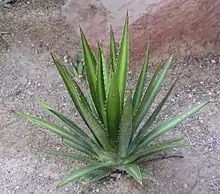| Agave lechuguilla | |
|---|---|
 | |
| Scientific classification | |
| Kingdom: | Plantae |
| Clade: | Tracheophytes |
| Clade: | Angiosperms |
| Clade: | Monocots |
| Order: | Asparagales |
| Family: | Asparagaceae |
| Subfamily: | Agavoideae |
| Genus: | Agave |
| Species: | A. lechuguilla |
| Binomial name | |
| Agave lechuguilla | |
| Synonyms[3] | |
| |
Agave lechuguilla (common name in Chihuahua: lechuguilla, meaning "small lettuce") is an Agave species found only in the Chihuahuan Desert. The plant flowers once in its life and then dies.
Description
The plant reproduces most often through underground offshoots, creating large colonies.[4] It also can flower at any time after the plant has reached three to 21 years of age, producing a leafless stalk that can reach 3.7 metres (12 feet) in height.[4] The flower clusters are located at the top and are funnel-shaped in purples, reds, and yellows.[4] The plant dies after flowering in May–July.[4][5] The leaves are long, tough, and rigid, with very sharp, hard points that can easily penetrate clothing and even leather, giving the colloquial name "shin-daggers".
Taxonomy
Charles Wright first collected the plant in 1849 and it was described by John Torrey in 1859.[4]
Distribution and habitat
It is an indicator species in the Chihuahuan Desert, the only place it is found.[6] It typically grows on calcareous soils.[7]
Ecology
The plant makes up a large part of the diet of the collared peccary (javelina) in some areas.[8] Additionally, the flowers are a source of nutrients for insects, bats, and some birds. The plant is toxic to cattle and sheep, however.[9]
Uses
The water stored in the flowering stalks of this plant, rich in salts and minerals, is sold in Mexico as a sport drink. Native Mexicans have used fibers from the leaves (commonly called ixtle).[5] Roots of the plants were used as soap by Native Americans.[4]
References
- ↑ Hernández Sandoval, L.; Zamudio, S.; González-Elizondo, M.; Hernández-Martínez, M.; Matías-Palafox, M.; Sánchez, E. (2019). "Agave lechuguilla". IUCN Red List of Threatened Species. 2019: e.T44393414A125198188. doi:10.2305/IUCN.UK.2019-3.RLTS.T44393414A125198188.en. Retrieved 11 November 2021.
- ↑ "Agave lechuguilla". Germplasm Resources Information Network. Agricultural Research Service, United States Department of Agriculture. Retrieved 2011-05-02.
- ↑ Kew World Checklist
- 1 2 3 4 5 6 Morey, Roy (2008). Little Big Bend : Common, Uncommon, and Rare Plants of Big Bend National Park. Lubbock: Texas Tech University Press. p. 37. ISBN 9780896726130. OCLC 80359503.
- 1 2 Spellenberg, Richard (2001) [1979]. National Audubon Society Field Guide to North American Wildflowers: Western Region (rev ed.). Knopf. p. 325. ISBN 978-0-375-40233-3.
- ↑ West, Steve (2000). Northern Chihuahuan Desert Wildflowers. Globe Pequot. p. 44. ISBN 978-1-56044-980-5.
- ↑ Turner, Matt (2009). Remarkable Plants of Texas: Uncommon Accounts of Our Common Natives. Austin: University of Texas Press. pp. 109–113. ISBN 978-0-292-71851-7.
- ↑ Corn, J. L. and R. J. Warren. (1985). Seasonal food habits of the collared peccary in South Texas. Journal of Mammalogy. 66:1 155-59.
- ↑ Lechuguilla. Archived April 3, 2012, at the Wayback Machine Toxic plants of Texas. Texas A&M.
Further reading
- Flora of North America Editorial Committee (ed.). "Agave lechuguilla". Flora of North America North of Mexico (FNA). New York and Oxford: Oxford University Press – via eFloras.org, Missouri Botanical Garden, St. Louis, MO & Harvard University Herbaria, Cambridge, MA.
External links
 Data related to Agave lechuguilla at Wikispecies
Data related to Agave lechuguilla at Wikispecies Media related to Agave lechuguilla at Wikimedia Commons
Media related to Agave lechuguilla at Wikimedia Commons- USDA Plants Profile for Agave lechuguilla (lechuguilla)
- University of Michigan - Dearborn: Native American Ethnobotany: Agave lecheguilla (Maguey lechuguilla)
